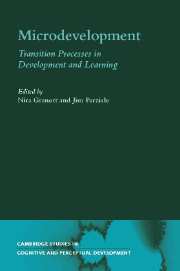Book contents
Microdevelopment: A process-oriented perspective for studying development and learning
Published online by Cambridge University Press: 22 September 2009
Summary
This book presents a new, process-oriented view of development and learning focusing on microdevelopment. Microdevelopment is the process of change in abilities, knowledge, and understanding during short time spans. The defining attributes of microdevelopment are embedded in its name. “Micro-” pertains to short time scales, periods ranging from months to just a few minutes. “Development” indicates the evolving nature of the process, the real-time (on-line) evolution of skills and abilities of development and learning. Studies of cognitive, motor, and emotional microdevelopment commonly focus on processes in which lower-level abilities are reorganized into higher-level ones (Werner, 1957). In this way abilities are examined as they are constructed and before they become automatic reactions (Vygotsky, 1978; Werner, 1957). The microdevelopmental perspective allows researchers to follow the evolution and modification of the functional models that people use (Inhelder et al., 1980). When observing microdevelopment, researchers examine processes within specific task contexts, while people solve problems, perform assignments, or make discoveries. They analyze the process of change, identify its attributes and patterns, and look for the processes that underlie quantitative and qualitative change (Miller & Coyle, 1999; Siegler, 1996). Researchers focus, then, on the “how” of development and learning, on giving explanations, which is the ultimate goal of science (Flavell, 1984).
State-oriented vs. process-oriented approaches
Although development and learning are evolving processes, their understanding has been based on comparing knowledge and abilities at different ages. In pre- and posttests or cross-sectional designs, researchers compare abilities at different time points.
- Type
- Chapter
- Information
- MicrodevelopmentTransition Processes in Development and Learning, pp. 1 - 28Publisher: Cambridge University PressPrint publication year: 2002
References
- 38
- Cited by

